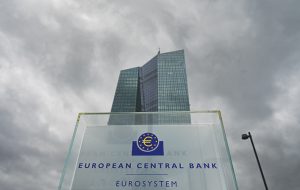BLOOMBERG
When the European Central Bank (ECB) sets interest rates, attention will be on the increasingly acrimonious path that lies ahead.
Despite its insistence on decisions being taken “meeting by meeting,†investors have grown accustomed to getting a preview of where borrowing costs are likely to head in the ensuing weeks and even months.
But with officials bickering over how much guidance is appropriate and what measure of inflation they should focus on, providing a clear message will prove trickier than at any point in what’s already the most forceful bout of monetary tightening of the euro era.
There’s little if any pushback against the plan to lift the deposit rate by another half-point this week. Any doubts were laid to rest by February’s dire reading for euro-zone underlying inflation, which kicks out volatile components like food and energy.
But tensions among rival factions within the 26-member Governing Council over the path beyond March are already spilling out into the open.
After Austria’s Robert Holzmann urged four more hefty rate rises, Italian central bank chief Ignazio Visco slammed colleagues advocating “prolonged†increases.
Such public sparring throws into question whether ECB policymakers can present a “unified picture†of their monetary-policy roadmap, warns Joerg Angele, an economist at Bantleon in Zurich.
“While the hawks keep calling for new interest-rate hikes with reference to the core inflation rate, the doves are now increasingly speaking out and calling for a cautious approach,†he said.
Fresh gross domestic product and inflation projections through 2025 probably won’t settle that debate.
Analysts polled by Bloomberg see forecasts for headline price gains being lowered from last quarter’s outlook after a plunge in energy costs. The path for core inflation, though, may be revised higher — at least in the near term.
That risks intensifying a debate that was already underway in February, according to an account of that month’s gathering.
Officials discussed how much weight to place on the underlying gauge, with one argument being that “some elements of core inflation could move quite quickly.â€
Such uncertainty is reflected in analysts’ views of how far the ECB must tighten.
The median estimate in a Bloomberg poll this month was for a 3.75% peak in the deposit rate — up from 2.5% now — with three quarter-point steps to follow the upcoming bigger move. Goldman Sachs and Deutsche Bank are among those backing such an outcome.
 The Gulf Time Newspaper One of the finest business newspapers in the UAE brought to you by our professional writers and editors.
The Gulf Time Newspaper One of the finest business newspapers in the UAE brought to you by our professional writers and editors.
